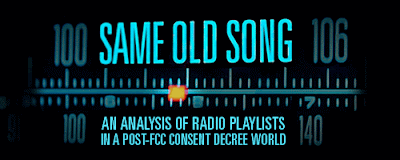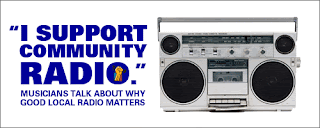
Earlier this week, Billboard reported that MusicFIRST — a coalition of music industry and musician union groups pushing for a public performance right for terrestrial radio — has “asked the FCC to investigate whether radio stations have violated their public interest obligation by allegedly boycotting artists who support a performance royalty for terrestrial radio.”
Without naming stations or companies, the coalition, in a 17-page Request For Declaratory Ruling filed at the commission late June 9, accuses "some broadcasters" of using their broadcast licenses "to further their financial interest at the expense of the public interest" and to "distort an important matter of public debate."
That “important matter” is the
Performance Rights Act – a bill that would compensate performing artists and sound copyright owners when their music is played on over-the-air broadcasts.
In case you’re new to this issue, here’s the quick scoop (more info is available in our handy
PPR fact sheet): Currently, when you hear a song on over-the-air broadcast radio in the US, the composer/songwriter/publisher are compensated for that "public performance" via ASCAP/BMI/SESAC, but the performer and record label are not. Meaning, if you hear
Aretha Franklin’s classic version of "Respect" on the radio, the songwriter (in this case,
Otis Redding's estate) and the publisher receive payment; the Queen of Soul (and her label) do not receive any performance royalties.
It’s important to note that when you hear the same song played on satellite radio, a webcast, or on a cable music station, Otis Redding’s estate and his publisher get their royalties from ASCAP/BMI/SESAC, and Aretha and record label are compensated via SoundExchange, the agency responsible for the collection and distribution of this digital royalty.
Although we’re not part of the MusicFIRST Coalition, FMC supports a Public Performance Right because it would directly compensate performers 45 percent of the royalties owed for the use of their music on over-the-air broadcasts. Additionally, the U.S. is one of the only industrialized nations without this right, which means American artists can't collect money owed to them for overseas spins of their music. This leaves millions on the table that would otherwise go to American performers.
Now, back to those boycott allegations. The MusicFIRST filing claims that some major broadcast group-owned stations notified a label that they were dropping a top-selling artist’s new single because that as-yet-unnamed artist had publicly voiced support of performance rights legislation. One station in Florida was singled out for allegedly telling a label it wouldn’t be adding any new music to rotation by an artist listed on the MusicFIRST website, and a Delaware station that dropped all artists associated with the coalition.
While we have no additional information regarding the veracity of these claims, we think that the FCC should take the filing seriously. Commercial broadcasters have a pretty big megaphone, and there are some examples in recent history showing that they can easily block otherwise popular artists from the airwaves. Remember when Cumulus and Cox Media instituted bans on playing
Dixie Chicks’ songs on their stations after singer
Natalie Maines made a statement about being “ashamed” that then-President Bush was from her home state of Texas? The First Amendment gives Maines the right to say that, and a private company (even one doing business on the public airwaves) has the right to not like it. But when this issue came up during a
Senate Commerce hearing in 2003, Cumulus CEO
Lew Dickey admitted that the decision to keep the Dixie Chicks off Cumulus' 50 country stations was made in the company's headquarters. The Dixie Chicks incident demonstrates that the massive consolidation in station ownership means that broadcasters can make national-level decisions about programming with potentially huge marketplace – or political – repercussions. And it can also have a chilling effect on speech.
The broadcasters’ heavy hand can also extend to musician compensation. Take, for example, the
2007 incident where Clear Channel attempted to force artists to waive their digital performance royalties (for the stations’ web streams of over-the-air content) as a consideration for airplay. FMC made a decent-sized fuss and ultimately — with the help of the American Association of Independent Music, who by the way, also support a performance right for terrestrial radio — Clear Channel ditched this onerous forced exemption.
Our point is that radio station group owners have demonstrated in the past that they the structural capacity to make programming decisions at the national level, so an artist-specific boycott is possible. We urge the FCC to follow up on these accusations and shed some light on the issue.
















